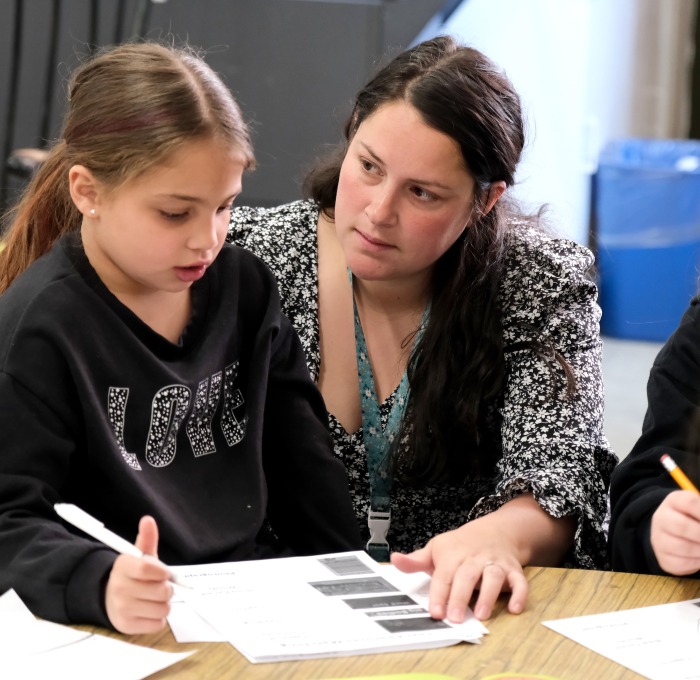This is a Fitchburg State University Alert: The opening of the university has been delayed 90 minutes on Wednesday, March 4. Offices will open at 9:30 a.m., and classes that start before 9:30 a.m. are canceled.
Special Education, MEd (Teacher of Students with Moderate Disabilities) (Initial Licensure, PreK-8 or 5-12, online)

In Short
Meets teacher, candidate, and PreK-12 district needs.
- Demonstrate knowledge of the field of special education, including legislation and litigation that has affected the rights of individuals with disabilities
- Demonstrate competence in teaching that leads to success for all students in the least restrictive environment
- Evaluate students to determine their educational needs and to design appropriate programs
What we're working on

Virtual Info Session
Tuesday, April 7, 2026, 5- 6 p.m.
Interested in pursuing a master's degree or certificate to specialize in reading or dyslexia? Hoping to become a licensed reading specialist in Massachusetts? Or, perhaps you are interested in taking Wilson Language courses and applying them to a degree program. Join us for an hour-long virtual info session to explore the multiple routes available. We will discuss options both for those with existing master's degrees and those seeking a first-time master's program.
Register for this virtual info session
Degree Overview
These programs are designed to prepare students for careers in teaching children with disabilities.
In addition to what's above, this program prepares graduates to:
- Collaborate with teachers and parents to develop effective teaching strategies that will enhance student’s learning
- Demonstrate sensitivity, understanding and respect for children and adults from diverse cultural, religious, ethnic, and racial backgrounds
Program Highlights
- Recognized as Highly Qualified Teachers through MA DOE
- Meets CEC Standards
- Fitchburg State University is a member in good standing of the Association for Advancing Quality in Educator Preparation (AAQEP), a national accrediting organization recognized by the Council for Higher Education Accreditation. This program has been awarded full accreditation by AAQEP through December 31, 2030. Accreditation acknowledges that a program prepares effective educators who continue to grow as professionals and has demonstrated the commitment and capacity to maintain quality.
Career Opportunities
The Moderate Disabilities Graduate Program provides teachers with the opportunity to work with individuals with special needs at the indicated levels. Career options include, but may not be limited to:
- Inclusion Teacher/Specialist
- Special Education Teacher
- Resource Room Teacher
Total Credits
Moderate Disabilities (Pre-K-8): 39 credits
Moderate Disabilities (5-12): 39 credits
Time Frame
While you can complete the program in as few as two years, you have six years to complete the program.
Hear from Sarah Curley about how Fitchburg State prepared her for her career in our Alumni Spotlight.
I love the program, the involvement of the professors, and the well-rounded classes. I am learning so much that is applicable to my profession.
Degrees and Other Information
- MEd, Special Education, Teacher of Students with Moderate Disabilities, Initial Licensure (Pre-K-8) Program Concentration - Program information from the University Catalog.
- MEd, Special Education, Teacher of Students with Moderate Disabilities, Initial Licensure (5-12) Program Concentration - Program information from the University Catalog.
- Two-Year Course Rotation (Pre-K-8) (PDF)
- Two-Year Course Rotation (5-12) (PDF)
All Teacher Candidates will meet the following Professional Standards for Teachers:
- Curriculum, Planning, and Assessment standard: Promotes the learning and growth of all students by providing high quality and coherent instruction, designing and administering authentic and meaningful student assessments, analyzing student performance and growth data, using this data to improve instruction, providing students with constructive feedback on an on-going basis, and continuously refining learning objectives.
- Teaching All Students standard: Promotes the learning and growth of all students through instructional practices that establish high expectations, create a safe and effective classroom environment, and demonstrate cultural proficiency.
- Family and Community Engagement standard: Promotes the learning and growth of all students through effective partnerships with families, caregivers, community members, and organizations.
- Professional Culture standard: Promotes the learning and growth of all students through ethical, culturally proficient, skilled, and collaborative practice.
Teacher candidates from Fitchburg State University will demonstrate the knowledge and skills required for their license including the following subject-matter knowledge standards:
- Support the integration of standards for literacy across the content areas as outlined in the 2017 ELA/Literacy Framework.
- Apply basic principles and concepts for digital literacy and computer science in Computing and Society, Digital Tools and Collaboration, and Computing Systems as outlined in the 2016 Digital Literacy Computer Science Framework.
- Apply the theories of cognitive, social, emotional, language, and physical development from childhood through adolescence.
- Understand the characteristics and instructional implications of moderately and severely disabling conditions.
- Apply special education policies and procedures.
- Support English learners through English learner education instruction.
In addition to the standards above, each program has specific subject-matter knowledge standards that teacher candidates must meet.
Moderate Disabilities Prek-8
- Knowledge of the significant theories, approaches, practices, and programs for developing reading skills and reading comprehension:
- Current research-based theories and practices for developing proficient and strategic readers; familiarity with programs and approaches for teaching literacy/reading.
- Principles and research-based instructional practices for developing proficient readers (phonics and word recognition, vocabulary, reading fluency, comprehension, and the reading-writing connection).
- Theories, research, and instructional practices for supporting readers with diverse cultural and linguistic backgrounds, strengths, and challenges.
- Knowledge of reading standards as outlined in the 2017 ELA/Literacy Curriculum Framework: reading for key ideas and details, craft and structure, integration of knowledge and ideas, and range of reading and text complexity.
- Instructional practices for supporting comprehension in a variety of genres and content areas.
- Knowledge of selection criteria for classroom literary and informational texts.
- Principles and research-based instructional practices for developing emergent reader skills (alphabetic principle, concepts of print, phonological and phonemic awareness).
- Phonemic awareness and phonics; principles, knowledge, and instructional practices.
- Use of assessment for instruction and intervention.
- Knowledge of a variety of formal and informal reading assessment tools.
- Use of data from screening, diagnostic, and formative assessments to identify individual strengths and weaknesses and to differentiate instruction (prepare mini-lessons, select appropriate materials, form flexible groups).
- Knowledge of Response to Intervention models/components, including tiered instruction, shared responsibility and decision-making, research-based interventions, and progress monitoring.
- Diagnosis and assessment of reading skills using standardized, criterion- referenced, and informal assessment instruments.
Teacher candidates must demonstrate the necessary depth and breadth of content knowledge needed to support all students in mastering expectations outlined in the following Massachusetts Curriculum Frameworks:
- 2017 English Language Arts (ELA)/Literacy Framework: Grades Pre-K-8
- 2017 Mathematics Curriculum Framework: Grades Pre-K-8
- 2016 Science and Technology/Engineering (STE) Curriculum Framework: Grades Pre-K-8
- 2018 History and Social Science Framework: Grades PreK-8
In addition to the content outlined above that aligns with the Massachusetts Curriculum Frameworks, teachers of Students with Moderate Disabilities should demonstrate the following knowledge and skills:
- Educational terminology for students with mild to moderate disabilities.
- Preparation, implementation, and evaluation of Individualized Education Programs (IEPs).
- Design or modification of curriculum, instructional materials, and general education classroom environments for students with moderate disabilities.
- Instruction on the appropriate use of augmentative and alternative communication and other assistive technologies.
- Ways to prepare and maintain students with disabilities for general education classrooms; for example, use of behavioral management principles.
- Knowledge of services provided by other agencies.
- Federal and state laws and regulations pertaining to special education.
Moderate Disabilities 5-12
Teacher candidates must demonstrate the necessary depth and breadth of content knowledge needed to support all students in mastering expectations outlined in the following Massachusetts Curriculum Frameworks:
- 2017 English Language Arts (ELA)/Literacy Framework: Grades 3-12
- 2017 Mathematics Curriculum Framework: Grades 3-12
- 2016 Science and Technology/Engineering (STE) Curriculum Framework: Grades 3-12
- 2018 History and Social Science Framework: Grades Pre-K-8
In addition to the content outlined above that aligns with the Massachusetts Curriculum Frameworks, teachers of Students with Moderate Disabilities should demonstrate the following knowledge and skills:
- Educational terminology for students with mild to moderate disabilities.
- Preparation, implementation, and evaluation of Individualized Education Programs (IEPs).
- Design or modification of curriculum, instructional materials, and general education classroom environments for students with moderate disabilities.
- Instruction on the appropriate use of augmentative and alternative communication and other assistive technologies.
- Ways to prepare and maintain students with disabilities for general education classrooms. For example, use of behavioral management principles.
- Knowledge of services provided by other agencies.
- Federal and state laws and regulations pertaining to special education.
Teachers of Students with Moderate Disabilities should demonstrate the following knowledge and skills:
- Educational terminology for students with mild to moderate disabilities.
- Preparation, implementation, and evaluation of Individualized Education Programs (IEPs).
- Design or modification of curriculum, instructional materials, and general education classroom environments for students with moderate disabilities.
- Instruction on the appropriate use of augmentative and alternative communication and other assistive technologies.
- Ways to prepare and maintain students with disabilities for general education classrooms; for example, use of behavioral management principles.
- Knowledge of services provided by other agencies.
- Federal and state laws and regulations pertaining to special education.
- For all Moderate Disabilities, Pre-K-8 and 5-12; it is expected that they demonstrate the knowledge needed to support students in mastering the foundations of reading.
- Current research-based theories and practices for developing proficient and strategic readers; familiarity with programs and approaches for teaching literacy/reading.
- Principles and research-based instructional practices for developing proficient readers (phonics and word recognition, vocabulary, reading fluency, comprehension, and the reading-writing connection).
- Theories, research, and instructional practices for supporting readers with diverse cultural and linguistic backgrounds, strengths, and challenges.
- Knowledge of reading standards as outlined in the 2017 ELA/Literacy Curriculum Framework: reading for key ideas and details, craft and structure, integration of knowledge and ideas, and range of reading and text complexity.
- Instructional practices for supporting comprehension in a variety of genres and content areas.
- Knowledge of selection criteria for classroom literary and informational texts.
- Principles and research-based instructional practices for developing emergent reader skills (alphabetic principle, concepts of print, phonological and phonemic awareness).
- Phonemic awareness and phonics; principles, knowledge, and instructional practices.
- Use of assessment for instruction and intervention.
- Knowledge of a variety of formal and informal reading assessment tools.
- Use of data from screening, diagnostic, and formative assessments to identify individual strengths and weaknesses and to differentiate instruction (prepare mini-lessons, select appropriate materials, form flexible groups).
- Knowledge of Response to Intervention models/components, including tiered instruction, shared responsibility and decision-making, research-based interventions, and progress monitoring.
- Diagnosis and assessment of reading skills using standardized, criterion- referenced, and informal assessment instruments.
Completed applications are reviewed on a rolling admission basis. Admissions requirements are as follows:
- Official transcript of a bachelor’s degree from a regionally accredited institution
- Three letters of recommendation
- Professional resume
- Passing scores for the Communication and Literacy subtest of the Massachusetts Test of Educator Licensure (MTEL) or copy of initial teaching license
- Official transcripts of graduate level course work from a regionally accredited institution (if applicable)
- Graduate application and fee
- An essay, no more than one page in length, in response to one of the following questions:
- Tell us about a positive situation in which you helped a person and made a significant difference in that person’s life.
- What are the most important factors in establishing a long-term working relationship with students, friends, etc.?
- Tell us about a significant event that involved you in a teaching or helping mode.
If you're currently teaching on an emergency license and would like to connect with an Enrollment Counselor to learn more about your options for earning your initial teaching license and master's degree, as well as MTEL workshops Fitchburg State offers, please fill out this brief form:
Still have questions? We're here to help!
We know you're busy, so we've given you a few different options to conveniently get the answers you need. You can…
- Email an enrollment counselor gce@fitchburgstate.edu or call 978.665.3182
- Attend an information session
- Watch a webinar





